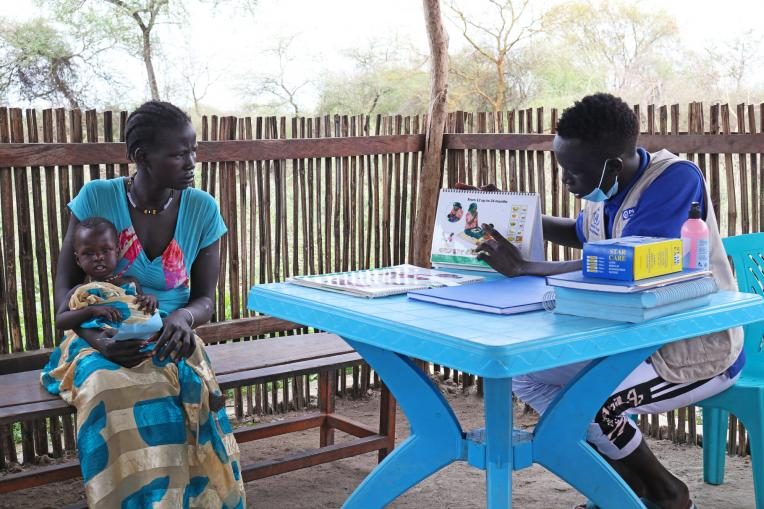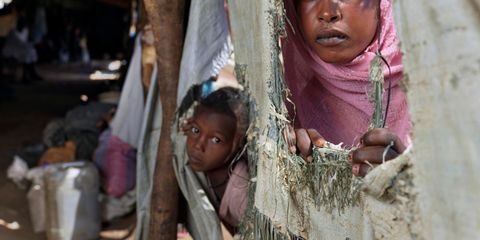Mothers Kaka and Nagali are facing multiple challenges to provide food for their children. They explain how the local nutrition centre has made a difference to their families.

Eighteen year old Kaka did not know what to do when her 2 year old twin boys fell ill. Neither were eating properly and both seemed lethargic and unhappy. “I didn’t see them play or eat together; it was worrying to me.”
Kaka dropped out of school early, not because she wanted to but because there is no high school in her community. As a result, she had to stop her studies and was married at the age of 16 and fell pregnant soon after. Many girls in Pibor face a similar experience. Almost all girls are forced to marry at an early age. “It was not possible to say no to the marriage, I did what others were doing at the same age.”
Diagnosed with malnutrition, Kaka’s sons were referred to one of Plan International’s nutrition centres in Pibor. “I had lost all hope before reaching the centre,” she recalls. After a month of treatment and the provision of supplementary food sachets, her children are now much better.
“It brought me a real happiness. Now both children are happy and play together,” Kaka says. “When they smile, it makes me happy.”
Communities in South Sudan are facing multiple challenges. Conflict and heavy flooding in Pibor county have forced families to migrate in search of clean water and grazing pasture. COVID-19 has further disrupted the few remaining services available.
Thirty year old Nagali’s baby is also receiving treatment at one of the centres. “I didn’t know my child was malnourished, but when a volunteer confirmed that my child was sick, she brought me to the site where she was provided with some ready to eat supplementary food.”
Nagali says her family lost their cows in the conflict which meant she was unable to provide any milk for her children, that’s why she thinks her child fell ill. “My child eating happily makes me happy. In few weeks’ time he will recover.”
Treating malnutrition
To prevent child malnutrition and promote healthy eating practices, Plan International has implemented a nutrition programme with funding from the World Food Programme in 21 villages in Pibor in close coordination with the local government and community leaders. The nutrition centres provide services to the most vulnerable children, pregnant and lactating women.
“When they smile, it makes me happy.”
Kaka
Mothers and their babies walk for up to an hour to visit the centres which have been established within a periphery of 4km from each other so that women and their young children don’t have to walk for more than an hour to reach a centre. Plan International has also set up mother’s group run by volunteers so that women can learn from each other and help one another during difficult times.
Community volunteers’ role is pivotal
Seventy two volunteers work with Plan International to visit families in Pibor and disseminate information about nutrition. When they visit a household where a child is sick, they tell them to go to one of the nutrition centes. Volunteer Nagechwor, 56, regularly visits families with malnourished children, measuring the circumference of the child’s arms to diagnose them.
“Supporting each other is the only means of survival here in our community. Our community is in very isolated place located in the middle of the bush.”
“I will continue to support the children and their mothers. Supporting each other is the only means of survival here in our community. Our community is in very isolated place located in the middle of the bush.”
Nutrition for vulnerable children and mothers
Our nutrition centres support children under the age of 5 years old, pregnant and lactating mothers who are among those who suffer the most during emergencies. In 2020, 8,329 children and 6,391 women received treatment at the centres. However, the need for these services has dramatically risen in last 6 months (September 2020 to March 2021), with around 10,000 children and 4,000 women admitted for the treatment.
“We largely prevent children from becoming severely malnourished, but this is not enough, there is more to do at these centres in order to reduce malnutrition and hunger. This would be possible by enhancing the preventive and promotive services in the community and providing integrated services on health, sanitation and livelihood,” explains Plan International South Sudan’s Nutrition Specialist, Mekonnen Get.
Categories: Early childhood development


